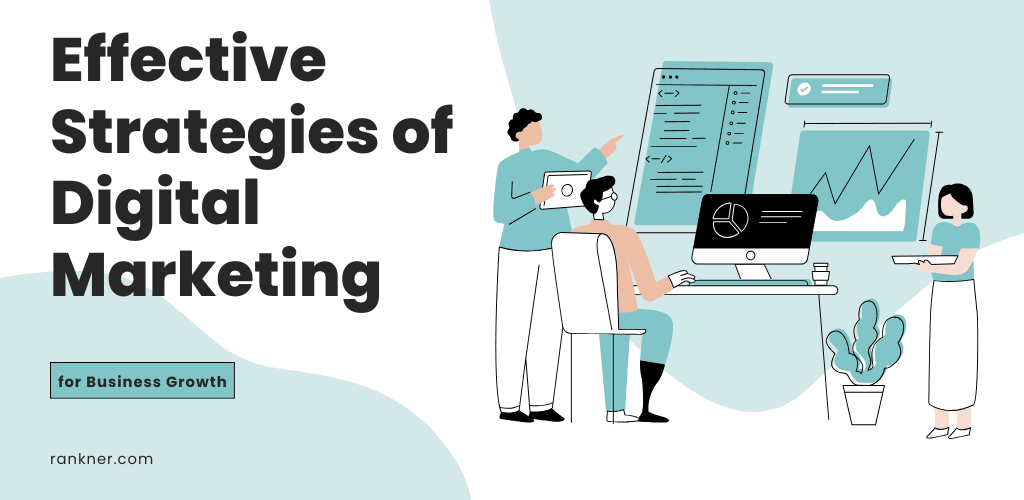7 Proven Digital Marketing Strategies to Boost Your Online Presence
Table of Contents
- Introduction
- Search Engine Optimization (SEO)
- Pay-Per-Click Advertising (PPC)
- Content Marketing
- Social Media Marketing
- Email Marketing
- Website Optimization
- Analytics and Measurement
- Conclusion
Introduction
In today’s digital age, having a solid online marketing strategy is crucial for business success. This blog post will explore effective strategies of digital marketing that can help you reach your target audience, increase brand awareness, and drive conversions. Whether you’re a small business owner or a marketing professional, these digital marketing tactics will help you create a comprehensive digital marketing plan to achieve your goals.
Search Engine Optimization (SEO)
Search engine optimization is a fundamental component of any digital marketing strategy. By optimizing your website for search engines, you can improve your visibility in search results and attract more organic traffic.
Key SEO strategies include:
- Keyword research and optimization
- On-page SEO (title tags, meta descriptions, header tags)
- Content creation and optimization
- Link building
- Technical SEO (site speed, mobile-friendliness, site structure)
To get started with SEO, consider using tools like Google Keyword Planner for keyword research and Google Search Console to monitor your site’s performance in search results.
Pay-Per-Click Advertising (PPC)
Pay-per-click advertising, particularly Amazon PPC management for e-commerce businesses, is an effective way to drive targeted traffic to your website. PPC allows you to display ads to potential customers when they search for relevant keywords.
Benefits of PPC advertising:
- Immediate visibility in search results
- Highly targeted advertising
- Measurable results and ROI
- Flexibility in budget and targeting options
For businesses selling products on Amazon, effective Amazon PPC management can significantly boost product visibility and sales. Consider using Amazon’s Sponsored Products and Sponsored Brands campaigns to promote your products.
Content Marketing
Content marketing is a crucial aspect of any digital marketing plan. By creating valuable, relevant content, you can attract and engage your target audience, establish thought leadership, and drive conversions.
Effective content marketing strategies include:
- Blog posts and articles
- Ebooks and whitepapers
- Infographics and visual content
- Videos and podcasts
- Case studies and customer success stories
When developing your content strategy, focus on creating high-quality, informative content that addresses your audience’s pain points and provides solutions to their problems.
Social Media Marketing
Social media platforms offer excellent opportunities to connect with your audience, build brand awareness, and drive traffic to your website. A well-planned social media marketing strategy can help you achieve these goals effectively.
Key aspects of social media marketing:
- Choose the right platforms for your target audience
- Create and share engaging content
- Interact with followers and build community
- Use paid social media advertising for increased reach
- Monitor and analyze social media performance
Consider using tools like Hootsuite or Buffer to manage your social media accounts and schedule posts across multiple platforms.
Email Marketing
Email marketing remains one of the most effective digital marketing tactics for nurturing leads and driving conversions. A well-executed email marketing campaign can help you stay top-of-mind with your audience and encourage repeat business.
Tips for successful email marketing:
- Build and segment your email list
- Create personalized and relevant content
- Use compelling subject lines
- Optimize for mobile devices
- Test and analyze email performance
Tools like Mailchimp or Constant Contact can help you manage your email campaigns and track their performance.
Website Optimization
Your website is often the first point of contact between your business and potential customers. Optimizing your website for user experience and conversions is crucial for the success of your digital marketing efforts.
Key areas of website optimization:
- Mobile responsiveness
- Page load speed
- Clear navigation and site structure
- Compelling calls-to-action (CTAs)
- A/B testing of key elements
Use tools like Google PageSpeed Insights to analyze your website’s performance and identify areas for improvement.
Analytics and Measurement
To ensure the success of your digital marketing campaign, it’s essential to track and measure your performance regularly. By analyzing key metrics, you can identify what’s working and what needs improvement in your digital marketing strategy.
Important metrics to track:
- Website traffic and sources
- Conversion rates
- Bounce rates
- Time on site
- Social media engagement
- Email open and click-through rates
Google Analytics is a powerful, free tool that can help you track and analyze your website’s performance and user behavior.
Conclusion
Implementing these strategies of digital marketing can significantly improve your online presence and drive business growth. Remember that successful digital marketing requires ongoing effort, analysis, and adaptation. Regularly review your digital marketing plan, stay up-to-date with industry trends, and be willing to adjust your tactics based on performance data.
By combining these digital marketing strategies and consistently delivering value to your audience, you’ll be well-positioned to achieve your business goals in the digital landscape.
Have you implemented any of these digital marketing strategies? Which ones have been most effective for your business? Share your experiences in the comments below, and let’s discuss how we can further improve our digital marketing efforts.








